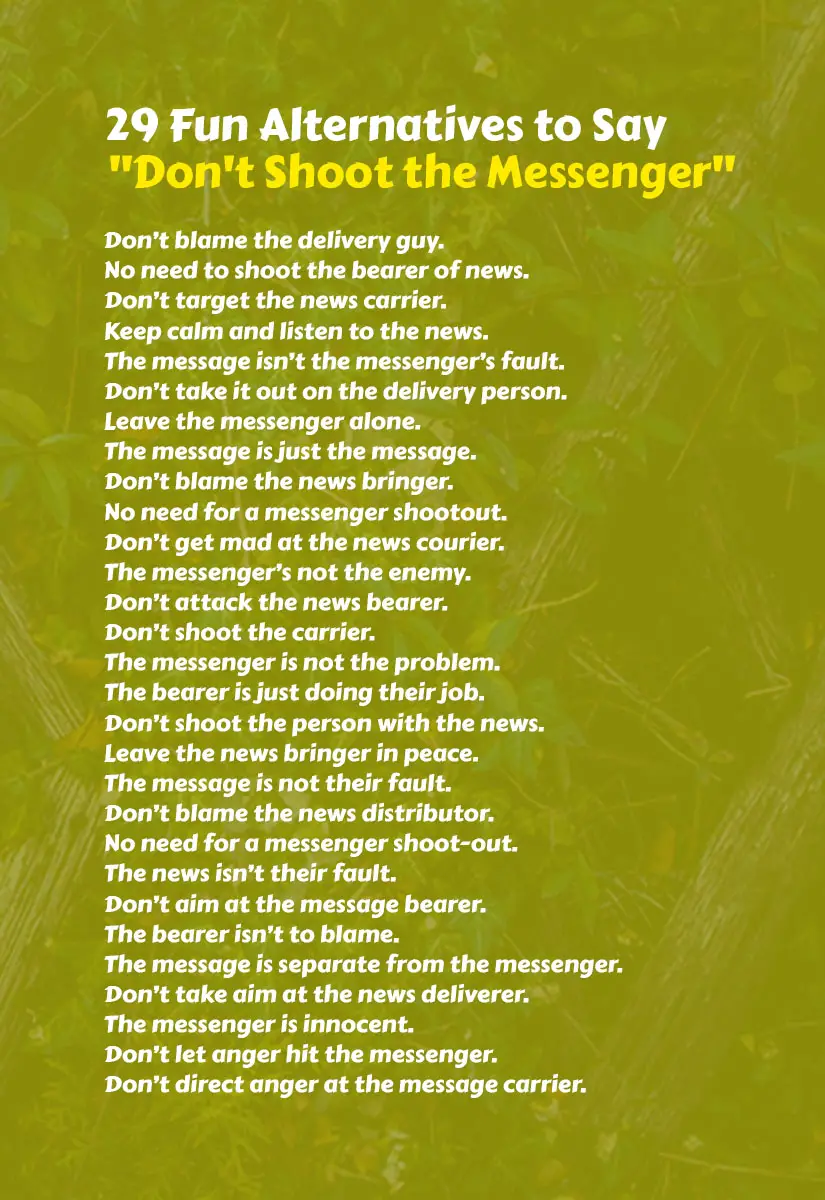You know that feeling when someone brings bad news, and everyone's quick to blame them? Instead of getting upset with the messenger, why not try a different approach? In this post, we'll explore some other ways to say “Don't shoot the messenger.” These phrases help you keep things cool and avoid taking your frustrations out on someone just delivering a message. Let's dive in and find some friendly ways to handle news with grace!

Here are 29 Another Ways to Say “Don’t Shoot the Messenger”:
- Don’t blame me for the news.
- I’m just the bearer of bad news.
- Don’t take it out on me.
- I’m only delivering the message.
- Don’t shoot the messenger.
- I’m not responsible for the news.
- Don’t blame me for what I say.
- I’m just relaying information.
- Don’t get mad at me.
- I’m not the source of the problem.
- I’m just passing on the message.
- It’s not my fault.
- I’m just the conduit.
- I didn’t create the news.
- I’m only the messenger.
- Please don't blame me.
- I’m just the one telling you.
- I’m just reporting what I heard.
- Don’t direct your anger at me.
- I'm not responsible for this.
- I'm only passing along the message.
- Don't shoot the bearer of bad news.
- I’m just communicating the facts.
- Don't take your frustration out on me.
- I'm only delivering the information.
- Don’t blame me for what's happening.
- I’m just the one with the news.
- I didn't make the rules.
- I'm just sharing the details.
See Also: 30 Flirty Responses to I Need You
Why It’s Important to Avoid Blaming the Messenger
When you hear bad news, it's easy to feel upset. Sometimes, people get angry at the person who brings the news instead of focusing on the problem itself. This is called "blaming the messenger." It's important to understand why this is not a good idea.
Imagine you get a report from your boss that your project didn't go well. You might feel frustrated. It's natural to be upset. But remember, the person who told you this news is just passing along information. They didn't create the problem. Blaming them won't fix anything and can make the situation worse.
Blaming the messenger can hurt relationships. If you lash out at the person who delivered the news, they might not want to share important information with you in the future. This could lead to even bigger problems. Good communication is key to solving issues, and that means being able to discuss problems without anger or blame.
Instead of blaming the messenger, try to focus on finding a solution to the problem. Ask questions to understand the situation better. Work with others to come up with ideas to fix the issue. By doing this, you'll solve the problem more effectively and keep good relationships with those around you.
Also, remember that everyone makes mistakes. If the messenger is at fault, address the issue calmly and constructively. Focus on fixing the mistake rather than getting upset with the person who pointed it out.
In short, blaming the messenger doesn't help anyone. It's better to address the problem directly, keep communication open, and work together to find a solution.
See Also: 22 Great Ways to Respond to I Dont Want to Make the Same Mistake Again
Understanding the Role of the Messenger in Communication
A messenger is someone who delivers news or information from one person to another. Their job is to pass along what they have been told, not to create or change the information. Understanding this role helps us respond more fairly when we receive news.
Think of a messenger like a mail carrier. The mail carrier brings your letters and packages but doesn't decide what is in them. Similarly, a person who shares news doesn't have control over what the news is. They are simply delivering it to you.
It's important to remember that the messenger is not responsible for the content of the message. If you receive bad news, like a problem at work or a difficult decision, the person telling you is just the bearer of that news. They didn't make the news happen.
Understanding the messenger's role helps us react more calmly. Instead of getting angry at the messenger, we can focus on the information itself. Ask questions to get more details. Think about how you can handle the situation better. This approach helps keep communication clear and respectful.
In relationships, whether personal or professional, knowing the role of the messenger can prevent misunderstandings. It keeps the focus on solving the problem rather than on blaming the person who delivered it. This helps build trust and improves communication.
In summary, the messenger's role is to deliver information, not to control or change it. By understanding this, we can respond more fairly and focus on resolving the issue at hand.
29 Clever Phrases to Replace “Don’t Shoot the Messenger”
- I'm just the bearer of news.
- I'm only delivering the facts.
- I'm here to pass along the message.
- Don't blame me for the news.
- I'm just relaying the information.
- I'm not the source, just the deliverer.
- I'm just the messenger, not the author.
- I'm only here to pass on the message.
- Don't take it out on me; I'm just the conduit.
- I'm just the link in the chain.
- I'm just the voice of the news.
- Don't shoot the sender; I'm just relaying.
- I'm just the carrier of the message.
- I'm merely passing on the details.
- I'm just a vehicle for the news.
- I'm here to share, not to cause trouble.
- I'm just the delivery person.
- I'm only bringing the news, not making it.
- I'm just reporting what I've heard.
- I'm not the author, just the messenger.
- I'm only conveying the message.
- I'm just the one passing it on.
- I'm not the source, just the delivery.
- I'm only the bringer of news.
- I'm just the facilitator of the information.
- I'm not responsible for the message, just for delivering it.
- I'm just the messenger, not the cause.
- Don't blame me; I'm just delivering the news.
- I'm merely passing along the information.
How to Respond to Bad News Without Taking It Out on the Messenger
Receiving bad news can be tough. It's natural to feel upset or frustrated. However, it's important to handle your emotions in a way that doesn't hurt others, especially the person who delivered the news.
First, take a deep breath. It's easy to react with anger or frustration when you hear bad news, but this can make the situation worse. Instead, give yourself a moment to process the information before responding. This helps you stay calm and think more clearly.
When you're ready, talk to the messenger in a calm and respectful way. Express your feelings without blaming them. For example, you might say, "I'm upset about this news, but I appreciate you letting me know." This way, you acknowledge your feelings without directing anger at the person who shared the news.
Ask questions to understand the situation better. This can help you get more details and figure out the next steps. For instance, you might ask, "Can you explain more about what happened?" This shows that you are focused on resolving the issue, not on blaming someone.
It's also helpful to discuss your feelings with others if you need support. Talking to friends or family can give you a different perspective and help you deal with your emotions in a healthy way. This way, you can handle the situation more effectively without taking it out on the messenger.
In summary, responding to bad news without taking it out on the messenger involves staying calm, talking respectfully, asking questions, and seeking support if needed. This approach helps keep communication open and constructive.
See Also: 28 Ways to Comeback When Someone Makes Fun of Your Looks
Alternative Phrases to “Don’t Shoot the Messenger”
The phrase "Don't shoot the messenger" means don't blame the person who brings bad news. There are other ways to say this idea in different words. These phrases can help express the same message in various situations.
One alternative phrase is "Don't blame me for the news." This is a straightforward way to say that the person delivering the news is not responsible for what the news is about. It's a clear reminder that the issue is not their fault.
Another phrase you might hear is "It's not my fault, I'm just the bearer." This emphasizes that the person is only delivering information and did not create the problem. It helps remind others that blaming them won't solve the issue.
You might also use "I'm just the messenger, not the maker of the news." This phrase highlights the difference between delivering the news and being responsible for it. It's a way to make it clear that the person has no control over the content of the message.
In different cultures, there are various ways to express this idea. For example, in some places, people might say "I'm only the conduit," meaning they are just passing along the information. This phrase suggests that they are a link between the source of the news and the person receiving it.
Using these phrases helps communicate the idea that the messenger is not to blame. It can make conversations about bad news more respectful and clear, and it helps keep the focus on finding solutions rather than placing blame.

The Impact of Blaming Messengers on Workplace Communication
Blaming the messenger in a workplace can cause many problems. When people get upset with the person who delivers bad news, it can harm communication and teamwork. Understanding the impact of this behavior helps us create a better work environment.
When you blame the messenger, it can lead to a negative atmosphere. People might feel afraid to share important information if they think they will be blamed. This can result in important issues being kept hidden, which can make problems worse.
Blaming the messenger also affects teamwork. If someone is criticized for delivering bad news, it can create tension and conflict among team members. This can hurt collaboration and make it harder to work together effectively.
It's important to handle bad news professionally. Instead of focusing on the messenger, try to address the problem directly. Discuss the issue with the right people and work on finding solutions. This approach keeps communication open and helps build trust within the team.
Creating a positive work environment means being respectful and understanding. Encourage open communication and support team members who share important information. This helps everyone work together better and handle challenges more effectively.
In summary, blaming messengers in the workplace can create a negative atmosphere and hurt teamwork. Focusing on solving problems and supporting open communication leads to a more positive and productive work environment.
I hope this list of other ways to say “Don’t shoot the messenger” helps you find the right words in tricky situations. Remember, it’s important to focus on the message, not the person delivering it. By using these phrases, you can keep conversations respectful and avoid blaming someone just because they are sharing news or information. Keep these alternatives in mind for smoother communication!









